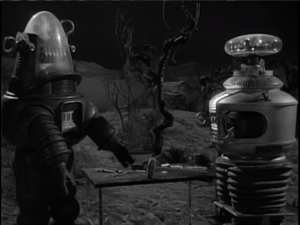So I’m sitting at lunch, reading, and there are these two guys at the next table. One is young–under 30, I think–one middle-aged. My generation. Full head of hair but it’s gray. I judge by mannerisms. Young guy has a couple lines on his face, but his body language says his mind is still in a dorm room. Middle-aged guy has that pose that says he knows he’s in charge. Call it 55-60. I suck at guessing ages. A lot of people my age look pretty damn old to me. I’m still reeling from learning that I’m now older than Frank Morgan was when he played the Wizard of Oz. Damn.
Anyway, this older guy was berating–civilly, but still berating–the younger one for things like “not stepping outside the comfort zone,” and not being aggressive enough with clients or customers or whatever. And the younger guy was taking it, apologizing all over himself, explaining himself, admitting that he was falling down on the job…
In a pleasant lunch area, outside on a warm Fall day.
It was painful.
I don’t even know what they were saying, but the body language was enough to turn me off. What gets into a person my age that makes him think it’s okay to treat people that way? Like inferiors? And what gets into young person that he feels he has to respond in such a subservient manner?
Well, I guess that’s a little more understandable. We all need a way to earn a living. If this older guy is providing employment, it’s a survival mechanism for the younger one to treat him with deference, lest he lose his job.
But, really…? Should it work that way? Should people feel like grocery store produce that has to be properly oiled and placed, so they can sell themselves? And should anyone feel like it’s appropriate to receive that kind of deference? Or deliver that kind of harsh reprimand?
I guess it’s just my egalitarian nature, but that kind of display just makes me uncomfortable. Above all, when it comes to the people who work for me, I believe in displaying compassion, letting them know I’m on their side. Encouraging their strengths, and, if I find weaknesses, addressing them with an eye toward help the individual employee make his life better, not making him fill some mold I’ve chiseled out. Sure, if the person doesn’t fit the needs of the job, they may have to find another job. But you accomplish an awful lot by treating people as though they’re succeeding, and believing the best of them at all times.
I think–I hope–that I tried to raise my kids the same way. I’d hate to meet that guy’s kids.
Which guy? Honestly, either one. Kids don’t need role models who bully, and they don’t need to be taught that the way to succeed is to toady to bullies.
Maybe I’m misjudging the entire situation. I don’t know how I look to outsiders. I don’t know how I look to my own employees. I can ask, and I do. “Do I ever set unreasonable goals for you?” “Do I ever leave you wondering which way to turn?” “Do I ever make you feel like I don’t have time for you?”
They give me positive feedback, but… do they do it because they feel they have to? Last week I was told that a colleague was “afraid” of me. Didn’t want to ask me for anything, because I’m so intimidating.
I don’t think I’m intimidating, but who knows what we look like in the eyes of others?
That scene at lunch still bothers me. It’s like it was happening in a world I didn’t want to be a part of. But can a whole different world by just a few feet away?



